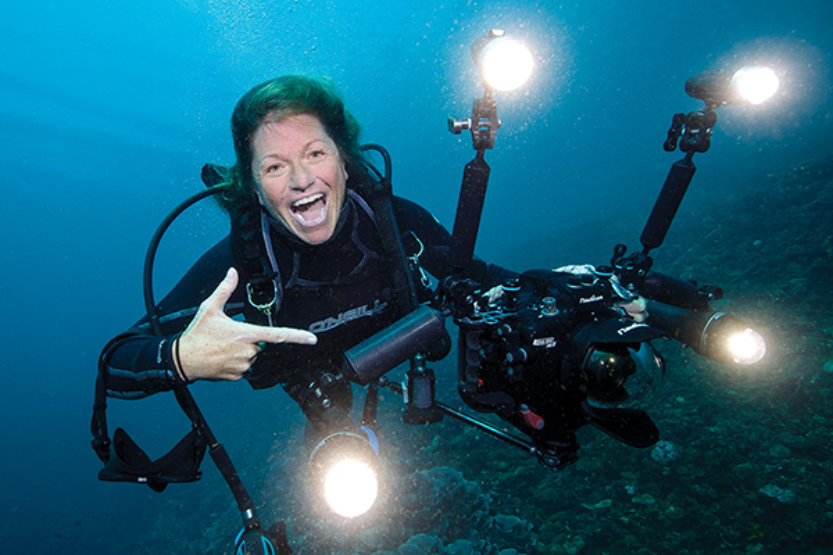Alumni Interview: Annie Crawley
 Annie Crawley, ’90 MEDIA, invites you to “dive into your imagination” through her work as a photographer, filmmaker, educator and ocean advocate.
Annie Crawley, ’90 MEDIA, invites you to “dive into your imagination” through her work as a photographer, filmmaker, educator and ocean advocate. We’re all water babies.We spend our first nine months in water. Then we’re taught to fear drowning. We think about that, instead of realizing we live on a water planet that’s 70 percent ocean. We shouldn’t be called planet Earth, we should be called planet Ocean—and we should learn to swim, not because we’re scared, but so we can explore.
Without a healthy ocean, we are not healthy as people. Half the oxygen in every breath we take comes from the phytoplankton mass in our ocean. A healthy global economy is tied to a healthy global ocean. But we’re putting 8 million tons of plastic into the sea every year, along with carbon from our cars, buildings and planes.
My calling has become to help people bridge this divide. When I introduce somebody to my ocean—not the ocean as portrayed by the media or education—the first words out of their mouths are, “I found home.”
Early on, I was a tree climber; I found solace in nature. I was on the swim team from around age 8. My dad died when I was 8 months old, and so a lot of my childhood was rocky. But my grandmother lived a few blocks away from us. When I was 10 and she was 60, she started traveling, taking a trip every year. I’d go over and look at the world map in her kitchen and listen to her stories.
At the University of Illinois, I took Photojournalism 101 with Brian Johnson, MS ’87 MEDIA. He told me I had a real eye for photography and recommended that I sign up for more courses. I didn’t even own a camera but Brian lent me one. There was no turning back for me. I had discovered a passion to create images.
I saved my money for a year after college to go to Australia and do travel photography. About two weeks into my trip, there was a sign: “Learn to scuba dive.” I did, and the ocean gave me a freedom that I’d never had in my life.
I saved my money for a year after college to go to Australia and do travel photography. About two weeks into my trip, there was a sign: “Learn to scuba dive.” I did, and the ocean gave me a freedom that I’d never had in my life. I ended up in Queensland and New Zealand.
Finally, I moved back to Chicago, worked at the Field Museum and volunteered at the Shedd Aquarium. But I missed the ocean too much. I moved to California. I had three jobs—I was a part-time dive instructor, a crew member on boats and a sales rep.
My success in sales led me to a big sales meeting. There were a thousand people in attendance, but the speaker spoke right to me. He said: “You have to do things today other people don’t do in order to have the things you dream of tomorrow.” It was supposed to motivate me to do a killer job in sales. Instead, I walked into my boss’s office and gave my two weeks’ notice.
I sold my car, bought underwater camera housings and completed a seven-week underwater photo course. Afterward, I went around the world—Belize, the Galápagos, back to Indonesia and Papua New Guinea. I came back only because I was hired as the underwater cinematographer for 10 IMAX movies. When the funding fell through after two years, I started my own company to create books and other children’s products about the ocean. That was 2006.
My newest book for children, which comes out in March 2021, is called Planet Ocean. I’m featured in the book as a storyteller, and so are the kids I teach on my scuba diving team here in the Pacific Northwest. Stories are one of our most powerful tools.
When we create action around issues and become part of the solution, it’s amazing what happens. That keeps me from getting depressed by the destruction of climate change and ocean pollution. Besides traveling, writing, creating multi-media projects and running the dive team, I’m also a training columnist for Scuba Diving magazine and a keynote speaker for corporations, schools and other organizations.
Of course, sometimes I do feel there’s no hope. I have to remind myself that our ocean will regenerate itself in a million years. You and I will not be here when our planet recovers. But while I am here, I will do everything in my power to help the story of our ocean get told, to help other people connect to our life source.

